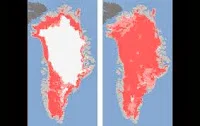Το καλό επίπεδο των οικονομικών σχέσεων των δύο χωρών αλλά και τις προοπτικές περαιτέρω ανάπτυξής τους, επιβεβαιώσαν οι δύο πρωθυπουργοί της Ελλάδας και της Κίνας στη συνάντηση που είχαν, σήμερα το πρωί στο Μιλάνο, στο περιθώριο της Συνόδου Κορυφής ΕΕ-Ασίας.
Ο Λι Κετσιάνγκ επισήμανε στον Αντώνη Σαμαρά ότι είναι ο πρώτος πρωθυπουργός που συναντά στο πλαίσιο σειράς επαφών που θα έχει με ξένους ηγέτες στο Μιλάνο. Εξέφρασε στον Έλληνα πρωθυπουργό την ικανοποίησή του για την επένδυση της Cosco στο λιμάνι του Πειραιά και την προοπτική επέκτασής της.
Επιβεβαίωσε δε το ενδιαφέρον της χώρας του για το ελληνικό πρόγραμμα ιδιωτικοποιήσεων που περιλαμβάνει, το Αεροδρόμιο Αθηνών, τους Σιδηροδρόμους, το αεροδρόμιο στο Καστέλι.
Τέλος, οι δύο ηγέτες αναφέρθηκαν στη συνέχιση της πολιτιστικής συνεργασίας ων δύο χωρών και στη σύσταση της Επιτροπής, από Κίνα, Ελλάδα και Αίγυπτο, με αντικείμενο την αποκωδικοποίηση των αρχαίων γλωσσών.
Επίσης έχει προγραμματιστεί συνάντηση του κ. Σαμαρά και με την πρωθυπουργό του Μπαγκλαντές ενώ στο περιθώριο των εργασιών της Συνόδου Κορυφής ο Έλληνας πρωθυπουργός θα έχει επαφές με Ευρωπαίους ομολόγους του.
energia.gr
16/10/14
--
-
ΣΧΕΤΙΚΑ:
Ο Λι Κετσιάνγκ επισήμανε στον Αντώνη Σαμαρά ότι είναι ο πρώτος πρωθυπουργός που συναντά στο πλαίσιο σειράς επαφών που θα έχει με ξένους ηγέτες στο Μιλάνο. Εξέφρασε στον Έλληνα πρωθυπουργό την ικανοποίησή του για την επένδυση της Cosco στο λιμάνι του Πειραιά και την προοπτική επέκτασής της.
Επιβεβαίωσε δε το ενδιαφέρον της χώρας του για το ελληνικό πρόγραμμα ιδιωτικοποιήσεων που περιλαμβάνει, το Αεροδρόμιο Αθηνών, τους Σιδηροδρόμους, το αεροδρόμιο στο Καστέλι.
- Ειδική αναφορά έγινε στις δυνατότητες ενεργειακής συνεργασίας, αλλά και στις σπάνιες γαίες στη χώρα μας. Σημειώνεται ότι επιτροπή από Κινέζους εμπειρογνώμωνες έχει επισκεφθεί τη χώρα μας για να αξιολογήσει τα περιθώρια αξιοποίησης του σπάνιου ορυκτού πλούτου. Ο κ. Κετσιάνγκ επανέλαβε ότι η Ελλάδα παραμένει η βασική πύλη εισόδου των κινεζικών προιόντων στην Ευρώπη.
Τέλος, οι δύο ηγέτες αναφέρθηκαν στη συνέχιση της πολιτιστικής συνεργασίας ων δύο χωρών και στη σύσταση της Επιτροπής, από Κίνα, Ελλάδα και Αίγυπτο, με αντικείμενο την αποκωδικοποίηση των αρχαίων γλωσσών.
Επίσης έχει προγραμματιστεί συνάντηση του κ. Σαμαρά και με την πρωθυπουργό του Μπαγκλαντές ενώ στο περιθώριο των εργασιών της Συνόδου Κορυφής ο Έλληνας πρωθυπουργός θα έχει επαφές με Ευρωπαίους ομολόγους του.
energia.gr
16/10/14
--
-
ΣΧΕΤΙΚΑ:
EUrare: Έρευνες για Σπάνιες Γαίες στην Ελλάδα με τη Συμμετοχή των ΕΜΠ, ΙΓΜΕ και Αλουμίνιον
Έρευνα: Μεγάλη εξάρτηση της τεχνολογίας από σπάνια υλικά. -Σπάνιες γαίες και πιθανή έλλειψή τους...
Ο ορυκτός πλούτος της Ελλάδας
Εξόρυξη ραδιενεργών κοιτασμάτων “σπάνιων γαιών” από την άμμο της θάλασσας σε όλη τη ζώνη από Στρυμόνα μέχρι Έβρο: μια εφιαλτική προοπτική
---
WTO Appellate Body rules against Chinese restrictions on access to rare earths and other raw materials (E.C.)
WTO confirms China’s export restrictions on rare earths and other raw materials incompatible with WTO rules. -European Commission
Rare earth metals: will demand be in line with supply?
China verlängert Produktionsstopp für Seltene Erden







 GR
GR FR
FR DE
DE ES
ES IT
IT RU
RU EU
EU